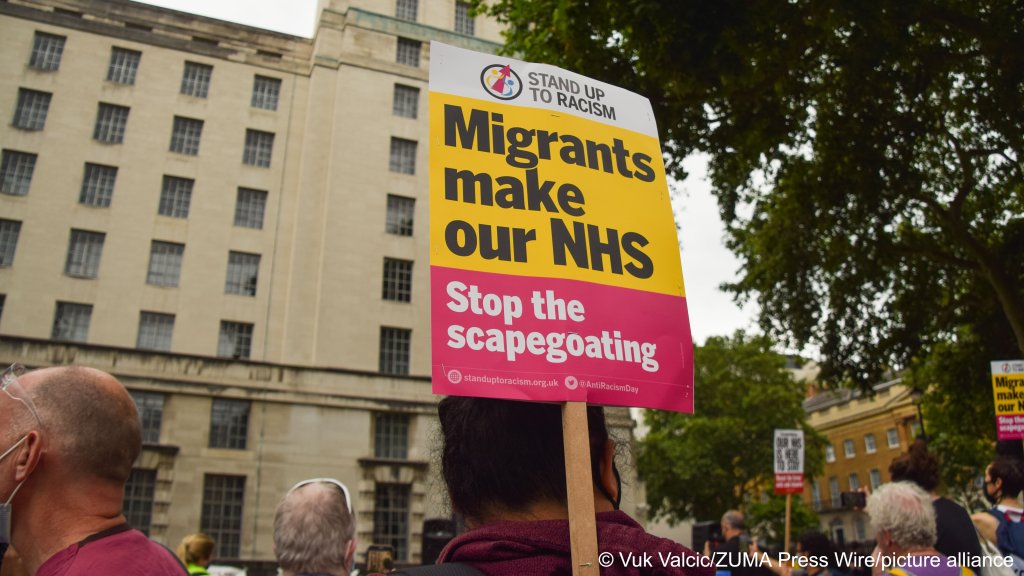The UK government’s new immigration white paper outlines major reforms aimed at reducing migration, with a key focus on ending reliance on overseas workers in the care sector amid ongoing staffing shortages.
The UK government’s Restoring Control Over the Immigration System white paper, released on Monday (May 12) 2025, proposes sweeping reforms to the immigration system.
The proposed changes, states the British government, are designed to reduce net migration while bolstering the domestic workforce. Among the most notable adjustments are the reconfiguration of skilled worker visa qualifications and the restriction of care worker recruitment from abroad.
The changes come hot on the heels of blows made to both the ruling Labour party and the main opposition party the Conservatives in local elections that took place on May 1. In those elections, both parties lost ground to the anti-migrant Reform party.
End of recruitment for care workers from abroad
One of the most immediate and controversial changes outlined in the white paper is the end of visas for overseas care workers. The government has decided to remove care workers from the list of eligible roles for skilled worker visas, meaning that employers in the care sector will no longer be able to recruit staff from outside the UK.
Home Secretary Yvette Cooper made it clear in a statement that this policy is part of a broader move to "end the reliance on foreign recruitment in the care sector." The plan is to shift the focus toward increasing the recruitment and training of local workers to fill the growing demand for care services. These new requirements on employers to boost domestic training will restore order to "a failed system," Cooper explained.
The government's decision to end overseas recruitment for care workers is expected to reduce the number of care worker visas issued annually by approximately 7,000, a move that aligns with the government's broader goal of reducing net migration. The change could have significant short-term impacts on the care sector, which has long struggled to meet staffing requirements.
Read AlsoUK government plans to restrict visa applications for certain categories
A transition period until 2028
To mitigate the immediate effects of this change, the government has proposed a transition period lasting until 2028. During this period, current overseas care workers will be allowed to extend their visas, and those already in the UK may be able to switch between visa categories. This transition phase is intended to give care providers time to develop strategies for increasing domestic recruitment and training efforts.

This period of flexibility will also help to prevent an abrupt disruption in care services while employers and the government work to develop sustainable domestic solutions to workforce shortages.
Read AlsoUK: Increasing reliance on migrant workforce
Raising the threshold for skilled worker visas
As part of the government’s push to reduce immigration and ensure that only highly skilled workers are allowed to enter the UK, the white paper proposes raising the qualification threshold for skilled worker visas. Currently, skilled worker visas are available for roles that require qualifications equivalent to A-levels (RQF Level 3). Under the new system, however, the threshold will be raised to require qualifications at the bachelor’s degree level (RQF Level 6).
This change will impact a wide array of sectors, including the care sector, as it limits the pool of eligible workers from overseas. While the government emphasizes that this is an effort to attract highly skilled professionals to the UK, critics argue that it could exacerbate existing staffing shortages in industries like healthcare and social care, where qualifications vary widely and often do not require a degree.
Read AlsoUK: Skilled workers visa route assessed and found wanting
Changes to residency and settlement rules
The white paper also includes provisions for tightening residency and settlement rules. Currently, individuals can apply for settlement in the UK after five years of residence, but under the proposed reforms, the qualifying period for settlement will be extended to ten years. However, individuals who make significant contributions to UK society, such as healthcare workers, may benefit from a faster track to permanent residency.

While the government maintains that this policy will allow the UK to retain the best and brightest workers, it has also sparked concerns about the long-term integration prospects of foreign nationals, particularly those in the care sector, where many workers are employed on temporary or low-wage contracts.
Read AlsoUK sees sharp drop in work visas as asylum claims reach record high
Reactions from the care sector
The care sector has responded with a mixture of concern and skepticism to the government’s proposals. Care providers have long relied on foreign workers to fill vacancies, especially in lower-skilled roles. With a high percentage of care staff coming from overseas, many fear that ending international recruitment will exacerbate the already dire staffing shortages.
Prof Nicola Ranger, the general secretary of the Royal College of Nursing will tell its annual congress that the Government's plans are about "pandering and scapegoating."
"The UK is so reliant on overseas colleagues, especially in social care. The Government has no plan to grow a domestic workforce. This is about politics - pandering and scapegoating. It should be about people," she will say. "We need an immigration system that works for care staff, nurses and the people who rely on them." Care England's chief executive Martin Green earlier labelled the government's plans as "cruel."

Care England, one of the leading bodies representing adult social care providers, has voiced concerns over the potential for "extreme workforce shortages." The organization has pointed out that international recruitment has been essential in alleviating some of the pressure on an already overstretched workforce. In a statement, Care England argued that without foreign recruitment, there may not be enough domestic workers to fill the growing number of vacancies.
The Confederation of British Industry (CBI) has also weighed in on the proposed reforms. CBI Chief Executive Rain Newton-Smith emphasized the importance of immigration in addressing skill shortages. "At times, businesses will face acute skill shortages. Of course, they’ll look for domestic routes to fill those, but there will be times when immigration is an important way," she noted. Her comments reflect a broader concern in the business community about the impact of the government’s new immigration restrictions.
Over the next few years, the care sector will need to adapt quickly to these changes, focusing on attracting and training more local workers to fill the gaps left by the reduction in overseas recruitment.
Read AlsoUK to restrict overseas care worker recruitment amid exploitation concerns
Government defends changes
The immigration shake-up follows Reform UK’s strong showing in local elections, driven in part by public concern over immigration levels. Critics claim Labour is reacting to political pressure. The Conservative Party accused Prime Minister Keir Starmer of "trying to steal credit" for recent drops in visa numbers triggered by Conservative-led reforms.
The UK government, led by Prime Minister Keir Starmer, maintains that these reforms are necessary to "have more control," Starmer said in a statement. Adding that enforcement "will be tougher than ever and migration numbers will fall."
In a statement, Starmer argued that the new approach would allow the UK to attract highly skilled workers while encouraging employers to invest more in domestic workforce training.
As the white paper progresses through its consultation phase and future legislative adjustments, the care sector's ability to secure and retain skilled workers will remain a key issue for policymakers and industry leaders alike.
Read AlsoUK: Government to refuse citizenship for undocumented migrants
With Reuters and dpa.
